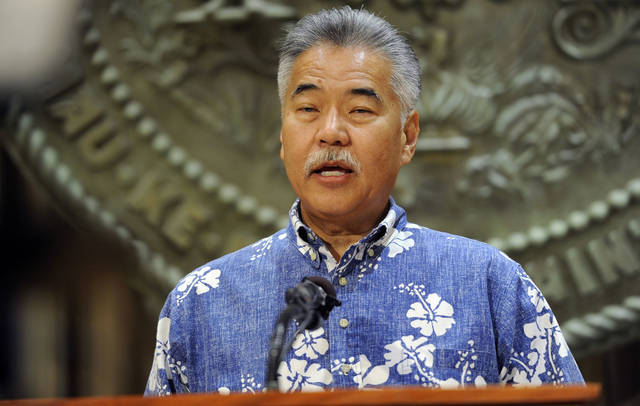Ige considering vetoes for AirBnB, industrial hemp bills

Twenty bills might be on the chopping block after Gov. David Ige revealed Monday which of them he is considering vetoing.
Twenty bills might be on the chopping block after Gov. David Ige revealed Monday which of them he is considering vetoing.
Among the list of various House and Senate bills are several high-profile bills relating to housing, controlled substances and more.
ADVERTISING
One of the bills that might be overruled is Senate Bill 1353, which would establish a permanent hemp-growing industry throughout the state, replacing the state’s current industrial hemp pilot program.
While Ige said he believes “there is a promising future in hemp,” he said SB 1353 is premature. Ige said he is concerned that the bill establishes a licensing structure that is unenforceable and might raise complications in how the state currently enforces medical cannabis use.
Another cannabis-related bill, House Bill 290, also is on Ige’s veto list. This bill would have authorized medical cannabis patients to transport medical cannabis products between the state’s islands.
Ige noted that the airspace and waters between the islands are still under the jurisdiction of the federal government, which still classifies cannabis as a Schedule I controlled substance, meaning travelers would still be subject to federal prosecution under the bill.
Ige said he is not certain which bills on the list will be vetoed, but said he likely will vetoSenate Bill 1292, which would require platforms like AirBnB to register as tax collection agents and collect general excise and transient accommodation taxes.
Ige explained the measure might interfere with a recently passed bill by the Honolulu City Council that establishes its own transient accommodation enforcement provisions, and said that the state’s transient accommodation strategy should be complementary to the counties’.
Ige also said he likely will veto Senate Bill 301, which would remove a tax dividend provided to real estate investment trusts. Ige said removing the dividend would likely have a chilling effect on investment in Hawaii.
The other bills on Ige’s list were as follows:
— House Bill 323, which would classify former military vehicles as “special interest vehicles” that owners could register. Ige determined that the bill would allow vehicles that don’t pass emission testing standards onto Hawaii roadways.
— Senate Bill 1405, which would require teachers to confiscate e-cigarettes from students, was added to the list because it lacked a definition of “electronic cigarette.”
— Senate Bill 1459, which would establish a State Commission on Surfing within the Department of Accounting and General Services. The proposed commission “is clearly outside of DAG’s mission of delivering quality support services in the areas of physical, financial and technical infrastructure support for state departments and agencies,” according to Ige’s list.
— House Bill 407, which requires that the Board of Education approve the termination of a Department of Education superintendent, was found to be redundant to the board’s existing authority.
— House Bill 629 would set up a medical release program for ill or disabled inmates who pose low risks to public safety. A similar program already exists, and the bill establishes short deadlines for employees, but no additional funding.
— House Bill 655, which would designate September as “Suicide Prevention and Awareness Month,” was found to have been forwarded to Ige in error.
— House Bill 702 would have prohibited the sale of an individual’s GPS location data without the consent of the individual, but was found to be unacceptably vague.
— House Bill 748 would have prohibited civil asset forfeiture except in the case of felony convictions. Ige said Hawaii law enforcement does not have a history of abusing civil asset forfeiture proceedings, which he said help agencies accrue additional resources.
— House Bill 1032 would establish a state boating facility lease pilot program, allowing the Department of Land and Natural Resources to lease Manele Small Boat Harbor on Lanai to private development. However, according to Ige’s list, the measure lacked public input for the use of Manele Harbor.
— House Bill 1276, which would establish a working group to develop best practices among teachers and schools, was added to the list for fear that it would encourage a “one-size-fits-all” approach to education.
— House Bill 1133 would limit commercial use permits for Molokini Shoal to no more than 40, but the DLNR already does so.
— Senate Bill 33 would increase the rolling cap for the state’s movie production tax credit from $35 to $50 million, but Ige said he fears the bill may infringe the University of Hawaii’s constitutional autonomy.
— Senate Bill 92, which would allow the families of murder or manslaughter victims to obtain police reports of the inciting incidents at the conclusion of civil proceedings, was found to be redundant and needlessly restrictive.
— Senate Bill 551 would allow condominium associations to conduct nonjudicial foreclosures, but was found to include an addition that “may present constitutional concerns.”
— Senate Bill 1423 would allow defendants to pay bail at any time throughout the week, not just during standard business days. However, the bill was found redundant to another bill.
— Senate Bill 1530 would transfer funding for the Hawaii Community Development Authority from the revolving to the general fund. However, the timeline for the bill was considered too narrow.
Email Michael Brestovansky at mbrestovansky@hawaiitribune-herald.com.


